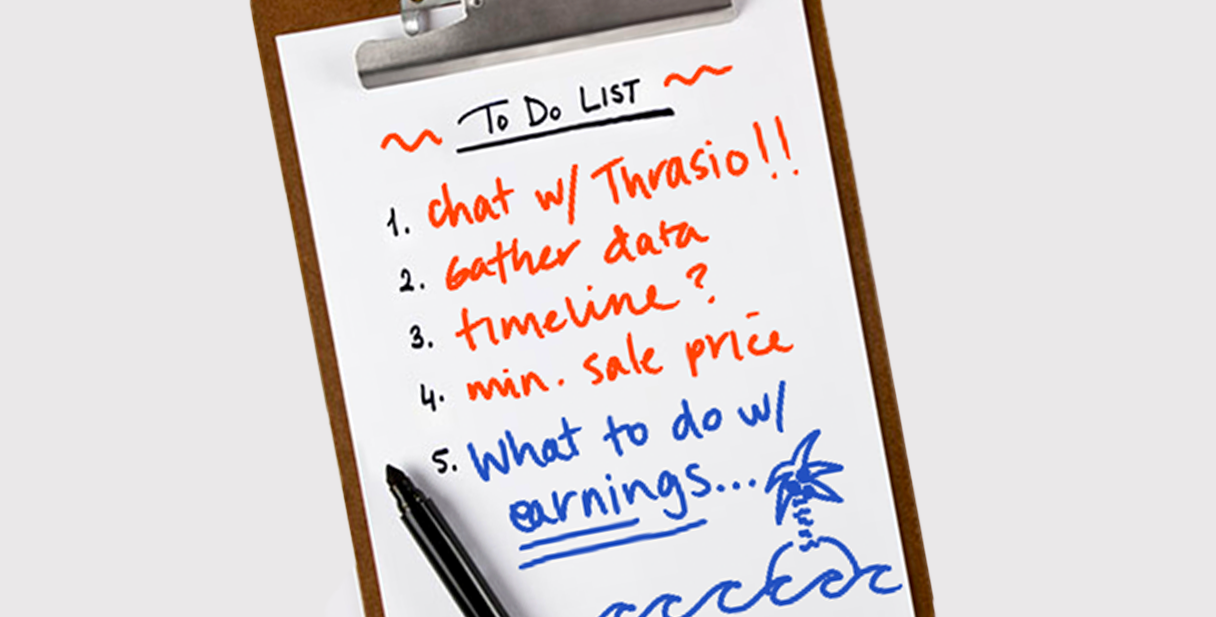How to Prep Your FBA Business for Acquisition
December 8, 2020 Jenna Craig
At Thrasio, we want sellers to know they don’t need to have everything perfect before talking to us about selling your FBA business. We’d rather have sellers connect with us when they first start thinking about selling their business than put off connecting with us because they’re trying to package everything up. However, sellers can do a few things to make the process run more smoothly for both themselves and potential buyers.
Think about your ideal exit
Start by asking yourself what you’re looking for from the deal. A few things to ponder:
• What’s the minimum sales price you are willing to accept?
• What are you hoping to do or accomplish with your earnings?
• Do you want to wash your hands of the business altogether, or are you hoping to remain involved?
• What’s your ideal timeline for selling your business?
• Do you have any employees to consider?
• What do you want to do next? Are you launching a new business? Retiring?
Once you firm up the big picture, you’ll be better prepared to talk to a buyer or a broker, and you’ll be more comfortable sitting at the negotiating table.
Put together performance data
When you sell your business, the prospective buyer will go through all of your performance data during the evaluation phase. Before entering into an LOI (Letter of Intent), which often requires a non-compete agreement, you’ll need to have at least a bare minimum of shareable data on how your business has performed historically—such as a Profit & Loss statement and sales data from each revenue channel.
In initial discussions, buyers will want to know simple figures like net monthly revenue, gross margins, and costs of goods sold. It’s good to have the most up-to-date information on hand to streamline this part of the process.
Clean up your finances
Keep your books in ship shape and up to date throughout the entire process. Make sure you’re paying your bills and keeping up with inventory. Our team does craft P&Ls for every deal, but you’ll want to have as much of the business financials in order as possible before reaching out to any other buyer or broker. If you’re working with a broker, you’ll likely be required to have a full accrual-based accounting of your business.
Secondly, but perhaps more importantly, you want to reach out to your accountant regarding selling your company. Identify any tax liabilities, and figure out the best overall deal structure for your tax position.
Choose between a broker and direct sell
There are pros and cons to both, and we work with both.
On the upside, when working with a broker, you have their experience and guidance to lean on throughout the process. If you are unfamiliar with selling a business, this may be a good option for you.
Additionally, brokers often have hundreds or even thousands of buyers looking at their listings.
On the other hand, the high volume of interest that comes through a broker often leads to many people wanting to “kick the tires.” You may be on multiple calls with buyers who are “shopping” that never go anywhere. As mentioned above, you need to have your financials entirely in order before your business can go on the market through a broker. Working through accrual-based accounting can be tedious. Your broker can work with you on this, but they’ll also have several other clients they’re working with, which may make the process feel transactional.
Broker fees and commissions are often 10-12% of the total deal price. These fees may be well worth it if you’ve never sold a business before or have other reservations. But you may make up those savings if you can forego paying for a financial audit and work directly with a buyer instead.
When you work directly with a buyer like Thrasio, you get a one-on-one relationship. It’s not transactional. We take the time to get to know you and your business through a series of conversations and emails—no pressure to take calls or entertain offers that don’t work for you. There’s no commission, so you get 100% of the purchase price—saving you that 10-12% commission rate. And the deal typically moves much quicker which is important to many people who run their own business and don’t want to draw out the process. If you aren’t a Quickbooks wizard or you need help creating a P&L, Thrasio can help you through the process and get you a valuation for your business typically in a few days.
Business as usual
Even when you’re confident a deal will close, you should always continue to operate your business as if you will still be the owner a year from now. You might assume since you’re selling or closing on a deal to hand over your business, you can pull back on PPC or don’t need to replenish inventory. But, if the deal falls through, you’re left holding the bag. We’ve seen it before when sellers have come to us after a previous deal fell through, and their business has lost significant value.
Do yourself (and potential buyers) a favor, and streamline your operations when you start thinking about selling. Continue doing everything that made your business a success throughout the entire acquisition process. You’ll protect yourself should you want to walk away from the deal at any time, and you’ll preserve the value of your business when it is time to negotiate its value.
Want to learn more about selling your business? Reach out to us!


